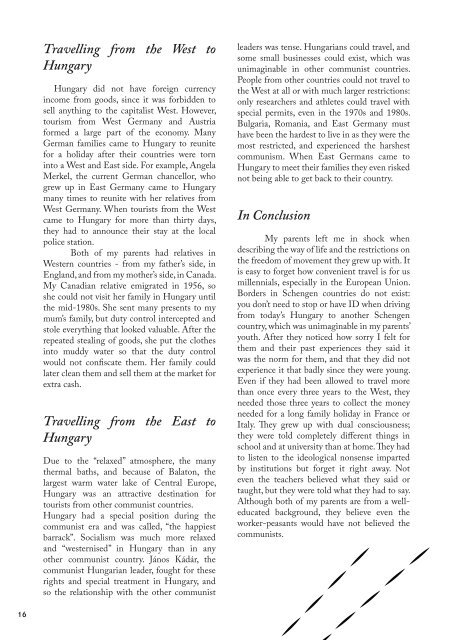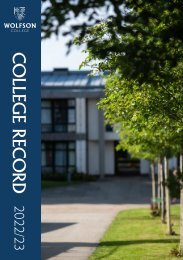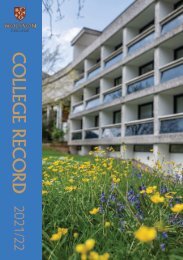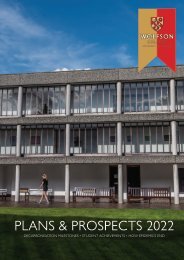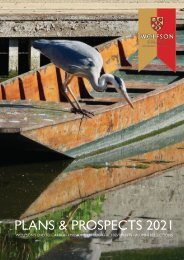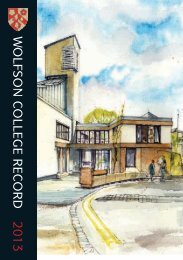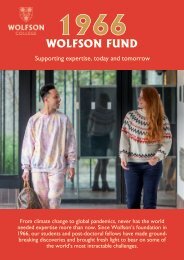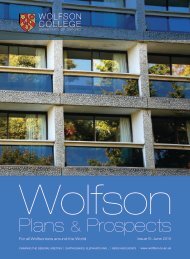Romulus 2018
Wolfson's Literary magazine Romulus
Wolfson's Literary magazine Romulus
- No tags were found...
Create successful ePaper yourself
Turn your PDF publications into a flip-book with our unique Google optimized e-Paper software.
Travelling from the West to<br />
Hungary<br />
Hungary did not have foreign currency<br />
income from goods, since it was forbidden to<br />
sell anything to the capitalist West. However,<br />
tourism from West Germany and Austria<br />
formed a large part of the economy. Many<br />
German families came to Hungary to reunite<br />
for a holiday after their countries were torn<br />
into a West and East side. For example, Angela<br />
Merkel, the current German chancellor, who<br />
grew up in East Germany came to Hungary<br />
many times to reunite with her relatives from<br />
West Germany. When tourists from the West<br />
came to Hungary for more than thirty days,<br />
they had to announce their stay at the local<br />
police station.<br />
Both of my parents had relatives in<br />
Western countries - from my father’s side, in<br />
England, and from my mother’s side, in Canada.<br />
My Canadian relative emigrated in 1956, so<br />
she could not visit her family in Hungary until<br />
the mid-1980s. She sent many presents to my<br />
mum’s family, but duty control intercepted and<br />
stole everything that looked valuable. After the<br />
repeated stealing of goods, she put the clothes<br />
into muddy water so that the duty control<br />
would not confiscate them. Her family could<br />
later clean them and sell them at the market for<br />
extra cash.<br />
Travelling from the East to<br />
Hungary<br />
Due to the “relaxed” atmosphere, the many<br />
thermal baths, and because of Balaton, the<br />
largest warm water lake of Central Europe,<br />
Hungary was an attractive destination for<br />
tourists from other communist countries.<br />
Hungary had a special position during the<br />
communist era and was called, “the happiest<br />
barrack”. Socialism was much more relaxed<br />
and “westernised” in Hungary than in any<br />
other communist country. János Kádár, the<br />
communist Hungarian leader, fought for these<br />
rights and special treatment in Hungary, and<br />
so the relationship with the other communist<br />
leaders was tense. Hungarians could travel, and<br />
some small businesses could exist, which was<br />
unimaginable in other communist countries.<br />
People from other countries could not travel to<br />
the West at all or with much larger restrictions:<br />
only researchers and athletes could travel with<br />
special permits, even in the 1970s and 1980s.<br />
Bulgaria, Romania, and East Germany must<br />
have been the hardest to live in as they were the<br />
most restricted, and experienced the harshest<br />
communism. When East Germans came to<br />
Hungary to meet their families they even risked<br />
not being able to get back to their country.<br />
In Conclusion<br />
My parents left me in shock when<br />
describing the way of life and the restrictions on<br />
the freedom of movement they grew up with. It<br />
is easy to forget how convenient travel is for us<br />
millennials, especially in the European Union.<br />
Borders in Schengen countries do not exist:<br />
you don’t need to stop or have ID when driving<br />
from today’s Hungary to another Schengen<br />
country, which was unimaginable in my parents’<br />
youth. After they noticed how sorry I felt for<br />
them and their past experiences they said it<br />
was the norm for them, and that they did not<br />
experience it that badly since they were young.<br />
Even if they had been allowed to travel more<br />
than once every three years to the West, they<br />
needed those three years to collect the money<br />
needed for a long family holiday in France or<br />
Italy. They grew up with dual consciousness;<br />
they were told completely different things in<br />
school and at university than at home. They had<br />
to listen to the ideological nonsense imparted<br />
by institutions but forget it right away. Not<br />
even the teachers believed what they said or<br />
taught, but they were told what they had to say.<br />
Although both of my parents are from a welleducated<br />
background, they believe even the<br />
worker-peasants would have not believed the<br />
communists.<br />
Lorenzo Petralia, ‘See you on the other side’<br />
16 17


